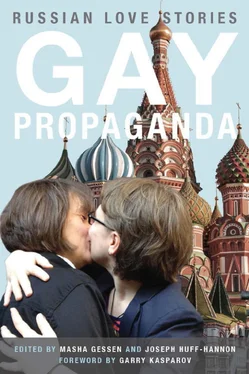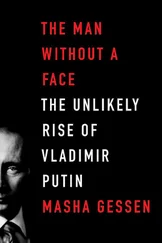LENA
Then I got work as an editor. I could work from home, so this didn’t get in the way of my studies. That lasted a year. And then I restored my relationship with my father and he said, “Quit your job.” That was the toughest year at the university, when you take your boards—half the people drop out at that point—and my father said he’d help me out during that year. After that, I got a job in my field.
NASTYA
And I got a good job right out of university in 2011 and we were finally able to get on our feet.
LENA
If we didn’t both specialize in Russian law, we’d probably have left the country by now.
NASTYA
It would be easier if we were engineers or something else that’s universal. As it is, we both need to get a new education in order to live abroad. That’s a hard decision to make; the memory of our last period of “going without” is still very recent. We’ve only just barely begun to accumulate a little bit of fat. And to be honest, I’ve never encountered any homophobia, except from my parents. And the case in which I represented a woman whose parents were trying to take her son away [see MARINA & ELENA: “And then they kidnapped my son for the first time,” p. 19]. But that was not a case of homophobia directed against me personally. At my last job, everyone knew and there was no problem. At my current job, I don’t really socialize with anyone.
LENA
I’ve only made one friend at my job, and I’ve told her. And her husband knows too.
NASTYA
As for the laws, in this country everyone’s rights are systematically violated. And I don’t feel hurt and limited by the anti-gay laws specifically, because all the laws they’re passing infringe on the rights of all citizens of the Russian Federation. And that does make us want to leave this sad country. Rather, this sad state.
But the state politics have given my parents a second wind. My mother called and said, “They’re going to start sending your kind to jail soon. You’re going to end up in jail.” I said, “Oh, goody, no one but women around.” She screamed and hung up. That’s how I communicate with my parents now. My father said, “Go try doing it with a man. What if you like it?” I said, “How about you go first? If you like it, I’ll try it too.”
—As told to Masha Gessen
VITALY MATVEEV
“In general, the way someone reacts to your coming out is a good filter.”
Scientist and photographer Vitaly Matveev, 35, returned to Moscow after many years of studying and working in Japan, Britain, and America. He’s not a gay activist or a revolutionary. But, as it turns out, living openly, as he grew accustomed to doing during his years abroad, is itself a form of activism—a battle with prejudice .
I’ll never forget it. I was 6. My mother and I went to the movies to see The Amphibian Man . In the middle of the movie, my mother bends down to me and whispers: “Look at how beautiful Guttiere [the female protagonist] is!” I nodded weakly, while not taking my eyes off Ichtiandr [the male protagonist]. I fell in love with him and asked to be taken to this movie a number of times. This goes to the question of why the very idea of “gay propaganda” is absurd. As a biologist, I know that sexual orientation is formed in the womb and is impossible to influence in any direction. It’s not a matter of choice. When I was a child, I didn’t know any of this, of course, and didn’t understand why I was attracted to the beautiful Ichtiandr.
In high school and college I dated girls. I didn’t lose my virginity to a man until I was 24, when I decided that I couldn’t lie to myself any longer and there was no point in resisting. This was in Thailand, where I was vacationing before going on a scientific expedition to Cambodia. It was with a man I met at the beach. I travel a lot. I’ve been to more than thirty countries and lived in three for an extended period. I haven’t paid particular attention to the significance of being openly gay in any of them.
In England, I worked so much I barely had time for a personal life. I lived in Japan for three years and had a boyfriend there. Japanese culture is infinitely tolerant; it’s not controversial being gay there. Our friends didn’t know about us for another reason: discussing your private life is very taboo in Japan. We had a group of friends, we all worked together, traveled, and hung out. I didn’t find out that some of the people in this group were dating until after I left, when they sent me their wedding photos. Before their weddings, they didn’t even show affection at parties. It wasn’t the custom.
America was the funniest. A Russian colleague got there before me. We’d been friends since childhood. She tried to woo me when we were in high school, and when it didn’t work, she decided I was gay. Many years later, in the States, having discovered I was going to the university where she was, she spread a rumor about my sexual orientation. I didn’t understand why everyone was so polite to me and so insistent on their level of tolerance.
In Russia, it was hard. I ended up having a real scene with my parents. My father, despite being deeply religious, was calmer about it than my mother. She was truly horrified, and, it seems, still hasn’t come to terms with it. Still, the very next day she told me she loved me, and that’s the most important thing. In general, the way someone reacts to you coming out is a good filter. You get rid of unnecessary ties; all of my real friends have passed this test.
In Russia, the problem isn’t with being openly gay—it’s the atmosphere. After I got back from Japan, I didn’t recognize the Moscow I loved. The people, the feeling: it was all different. One morning a friend and I were walking from a gay club to the subway. It was light out, I was headed to work, and we walked past a group of teenagers, about ten of them, drinking beer. We heard a scream, “Hey, faggots!” and immediately I felt someone kick me in the back. I turned around and punched the person who’d attacked me, but then they all jumped on us at the same time, threw us on the ground, and started beating us up. They kicked us in the head, the ribs, all over. I did karate for four years, and in a moment of rage and pain, I jumped up, grabbed a bottle out of one of their hands, and threw myself at them. We were saved by a patrol car going by. The teenagers took off and we got in the squad car and ended up catching two or three of them and taking them down to the station.
This was the only unpleasant incident I’ve ever gotten into because of my sexual orientation. It’s not only dangerous to be gay here, but really, to be anyone. That’s why a lot of my friends move out of the country or to different cities. Right now, I have an interesting job with a lot of responsibility. I really like it, but the question of emigrating is always open. With these norms and laws, I’m always considering it. Incidentally, they don’t know my sexual orientation at work. I’m not worried about it; I am not going to hide from anyone.
Recently, there was a funny incident. I was on a yacht in the Adriatic in very severe, masculine company, these guys from St. Petersburg. We started talking about Mykonos, and the conversation turned toward how it’s important to beat up fags. I couldn’t help myself and explained everything about myself. They were like, well, you’re one of us, you’re fine, but the rest of them we need to beat up.
I don’t think that a gay person’s personal life in Moscow is different than anyone else’s. It’s the same eternal lack of time and energy to find the right person and develop a serious relationship. In the three years I’ve been in Moscow, I’ve had a few flings and just one real relationship—again, with a foreigner. We met two years ago, on December 10, during the Bolotnaya Square protests. I remember how I’d packed my backpack in case I got arrested and that same evening I was showing it to my future boyfriend. We dated for more than six months in a number of countries and then we decided to move in together. We considered Moscow. His company has an office here, but he wasn’t able to get transferred, and anyway, we decided that Austria would be better for a gay couple. Plus, it’s easier for me as a scientist to find a job there than it is for him to find a job in Russia. We were discussing having kids. We even found a potential surrogate mother. And then everything ended suddenly, literally on the eve of my “trial move-in.” It happens.
Читать дальше












